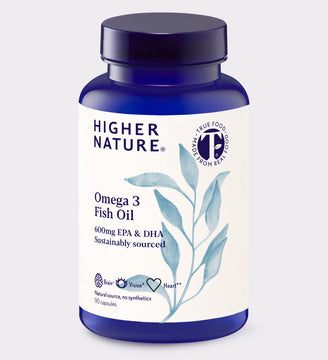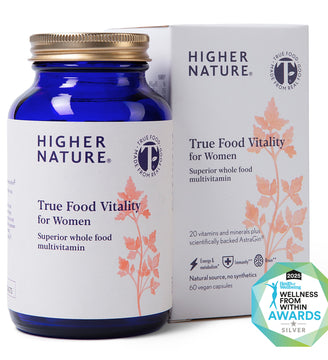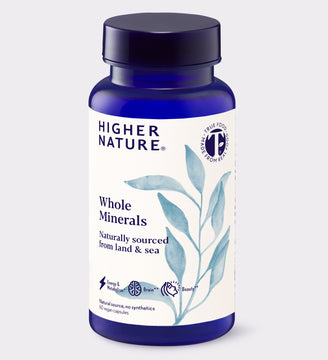
Get the plant-based glow - Collagen Alternatives
Higher Nature Nutrition Team
As pioneers of marine collagen we love its effect on skin, but what if you want the benefits but choose to be plant-based? Here’s how to optimise collagen production, maintain hydration and beat skin stressors so your skin remains supple and radiant.
Diet First
Your skin is always a reflection of your internal environment, and as with other areas of your health, what you put in you get out, so the best place to start is with your diet
Good quality protein is a must for ensuring your body has the building blocks for collagen production in the body. This is harder on a plant-based diet but focussing on a wider range of pulses, wholegrains (including rice, oats, quinoa, amaranth, buckwheat, whole wheat and rye), nuts and seeds, tofu and tempeh will give you the range of amino acids the skin needs.
Staying hydrated is also key for plumper, younger looking skin. This doesn’t have to mean endless glasses of water. Herbal teas, smoothies, soups and fruit and veggies all bump up your water intake too.
Cutting out sugar is also something your skin will thank you for. Sugar damages collagen and elastin fibres, so curbing a sweet tooth helps limit this damage.
Plenty of fresh veggies, berries and spices will also provide phytonutrients like quercetin, anthocyanidins, lycopene, lutein and curcumin your skin will love, as well as essential vitamins and minerals. These all show promise as effective free-radical scavengers, playing a key role in the fight against cell damage and cellular ageing.
Don’t forget good fats are also key to supporting healthy supple skin so top up on flax seeds, walnuts and pumpkin seeds for omegas 3 & 6 but include avocados, olive oil and other nuts and seeds for other healthy fats.
Skin loving nutrients
So now to some beneficial things you can add to your daily supplement plan if you want to top up further.
Vitamin C
This is the number one skin nutrient as it is needed for collagen production in the skin. Collagen making cells deep in the dermis thrive on a steady supply so to boost collagen production make this top of your list.
Vitamin C is also the most well-known antioxidant, protecting proteins, fats and DNA. It helps mop up free radical and reactive oxygen species (ROS) which are known to damage skin, speeding up age-related damage and showing as wrinkles and other visible signs of ageing.
Hyaluronic acid
Surrounding collagen fibres as part of the extra cellular matrix, this beauty secret plays a pivotal role in keeping the skin looking firm, hydrated and plump. Binding 1000x its weight in water, hyaluronic acid bathes the collagen fibres of the skin in moisture, smoothing out wrinkles for a youthful glow.
Astaxanthin
This powerful pink carotenoid astaxanthin derived from fresh water algae, has been shown to protect collagen fibres from age-accelerated damage. More potent than vitamins C or E, at mopping up damaging free-radicals and ROS, its naturally protective effects can be harnessed for the skin.
MSM
You might not have heard of this strange sounding compound but it naturally occurs in foods including fresh vegetables, dairy and meat. It’s a source of sulphur which the body needs for all its structural proteins including collagen, but also the most important cellular antioxidant, glutathione.
Zinc, Copper and Manganese
Damaging free radicals and ROS are also kept in check by your body’s own antioxidant enzymes, which rely on minerals including copper, zinc and manganese. This damage could be going on anywhere in the body but is most visible in the skin, causing the tell-tale signs of premature ageing, which we see as increased wrinkles and loss of structure and elasticity.
Live bacteria
If you want to optimise skin, look after your gut microbiome. The trillions of friendly bacteria in your gut form part of the gut-skin-axis and are essential to nutrient absorption and maintaining healthy elimination, resulting in clearer looking skin.
Omega 3 fats
Cell membranes are reliant on a steady supply of omega 3 fats in the diet to enable them to function most effectively. Low omega 3 levels can lead to dry skin which causes the skin to look more aged. Add flax and chia seeds daily to the diet or add in a liquid flax oil to help keep your skin looking vibrant and hydrated.
Smooth it on
Lock-in moisture to help smooth out visible lines by choosing a vegan moisturiser with plant-based oils like argan, avocado or grapeseed.
And finally….
Good sleep and low stress levels are vital for making sure your skin looks and feels great. Check out these articles if you want advice in these areas.
And So To Sleep | Higher Nature
Natural Stress Solutions | Higher Nature
Research suggests people who smile more look younger and more radiant, so don’t forget to do what you love to light up your face and keep that youthful glow!
Research links:
Vitamin C
Hyaluronic acid
Astaxanthin


















